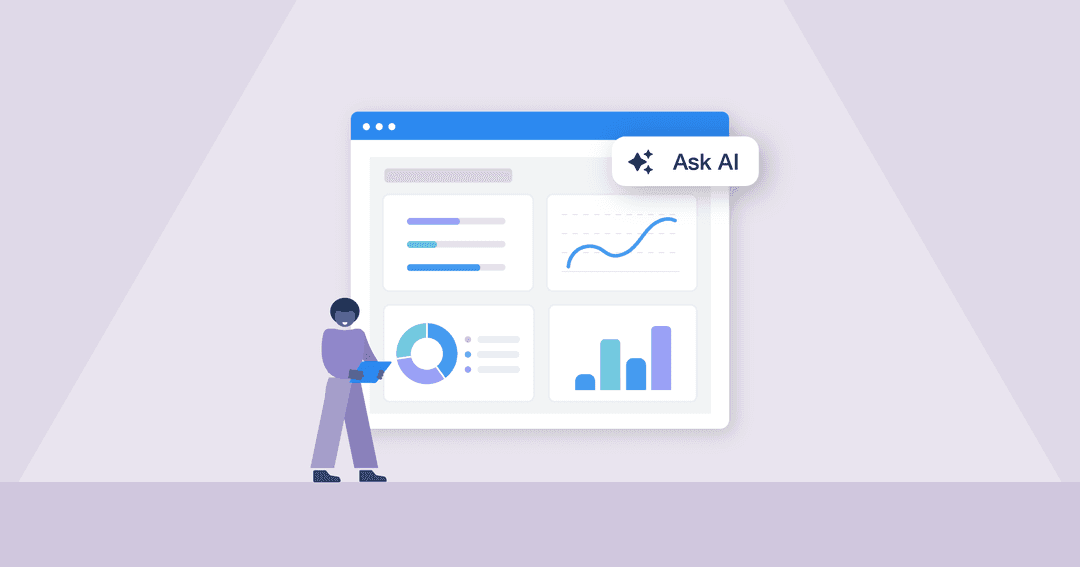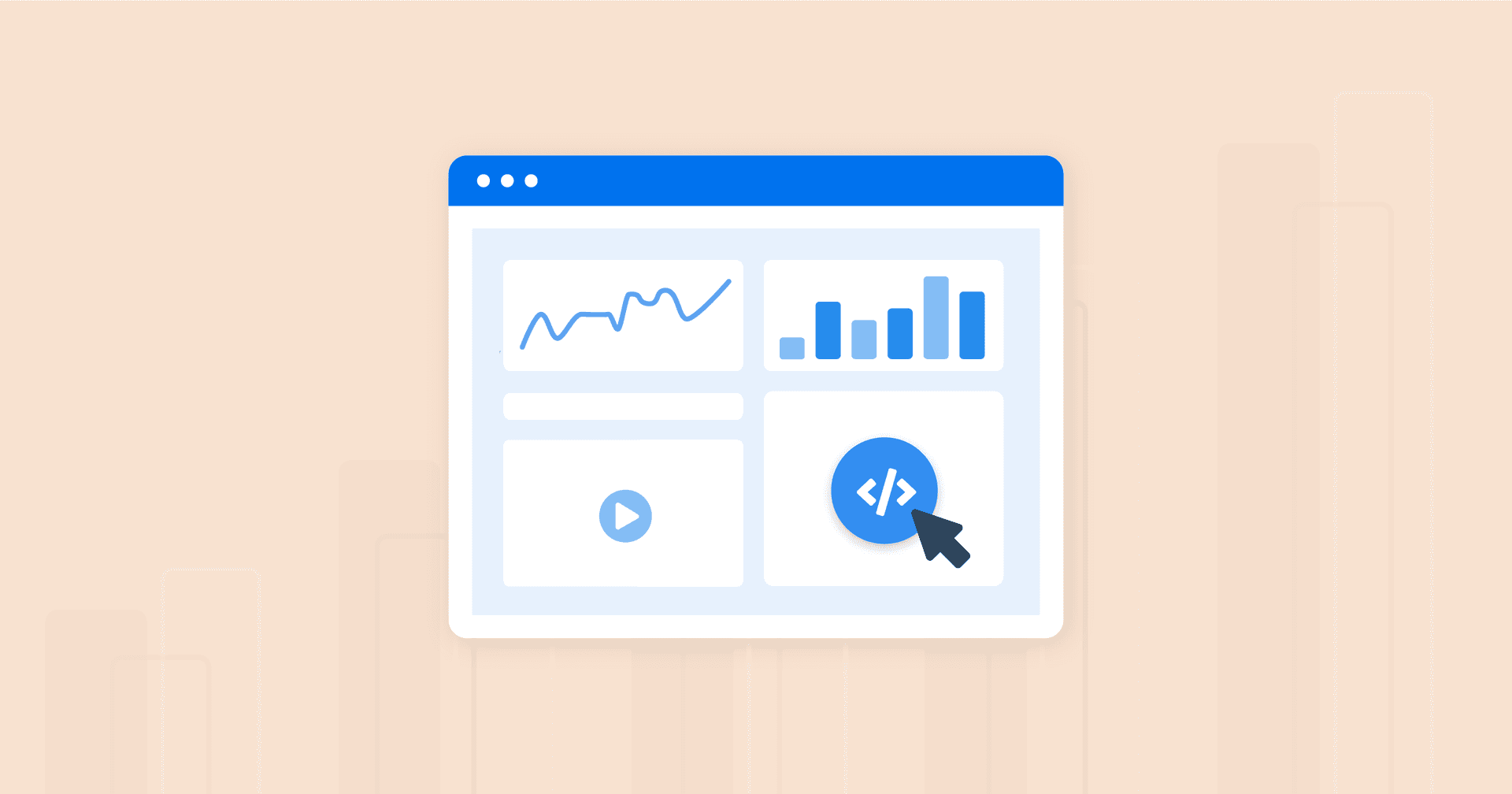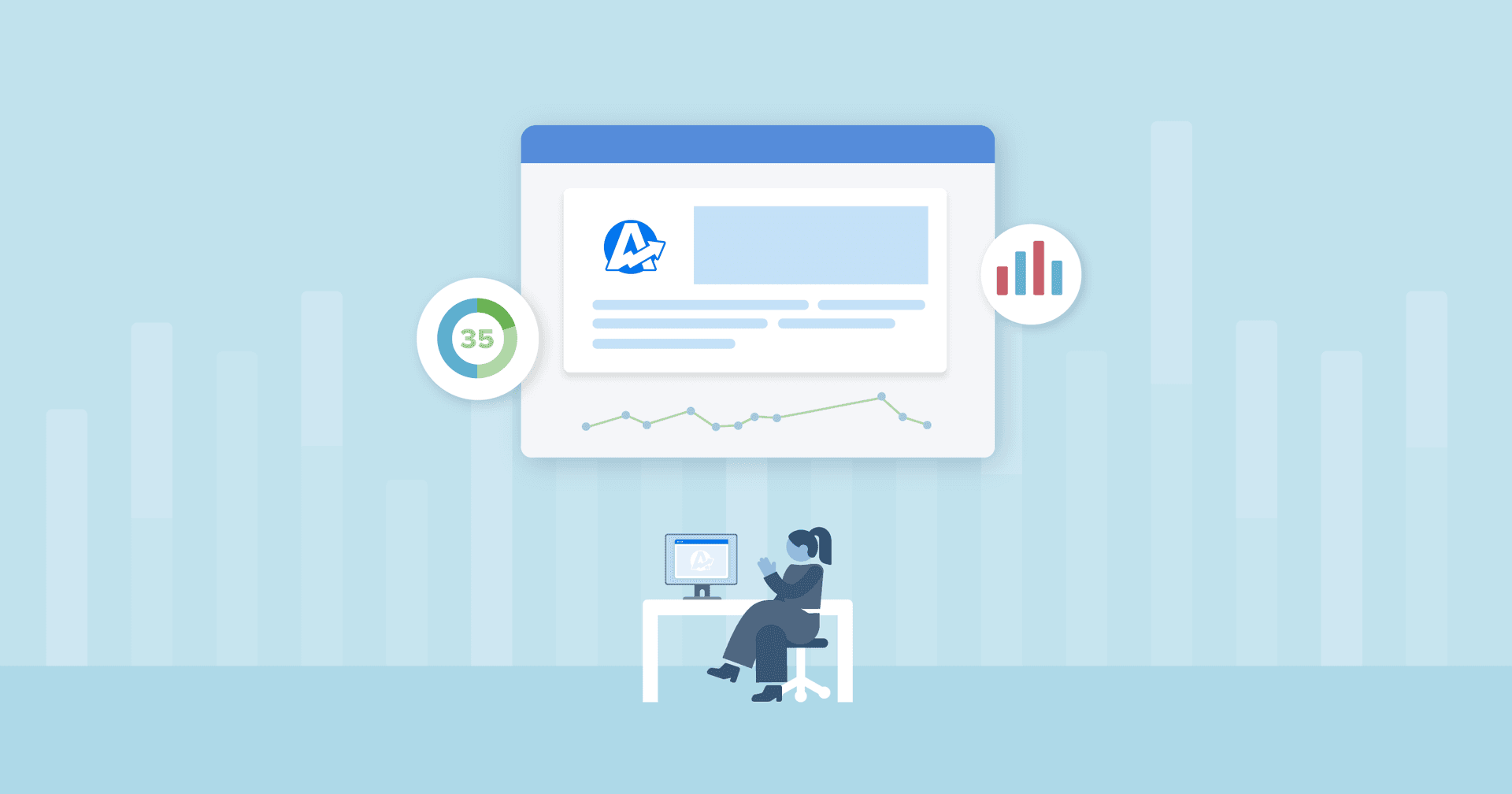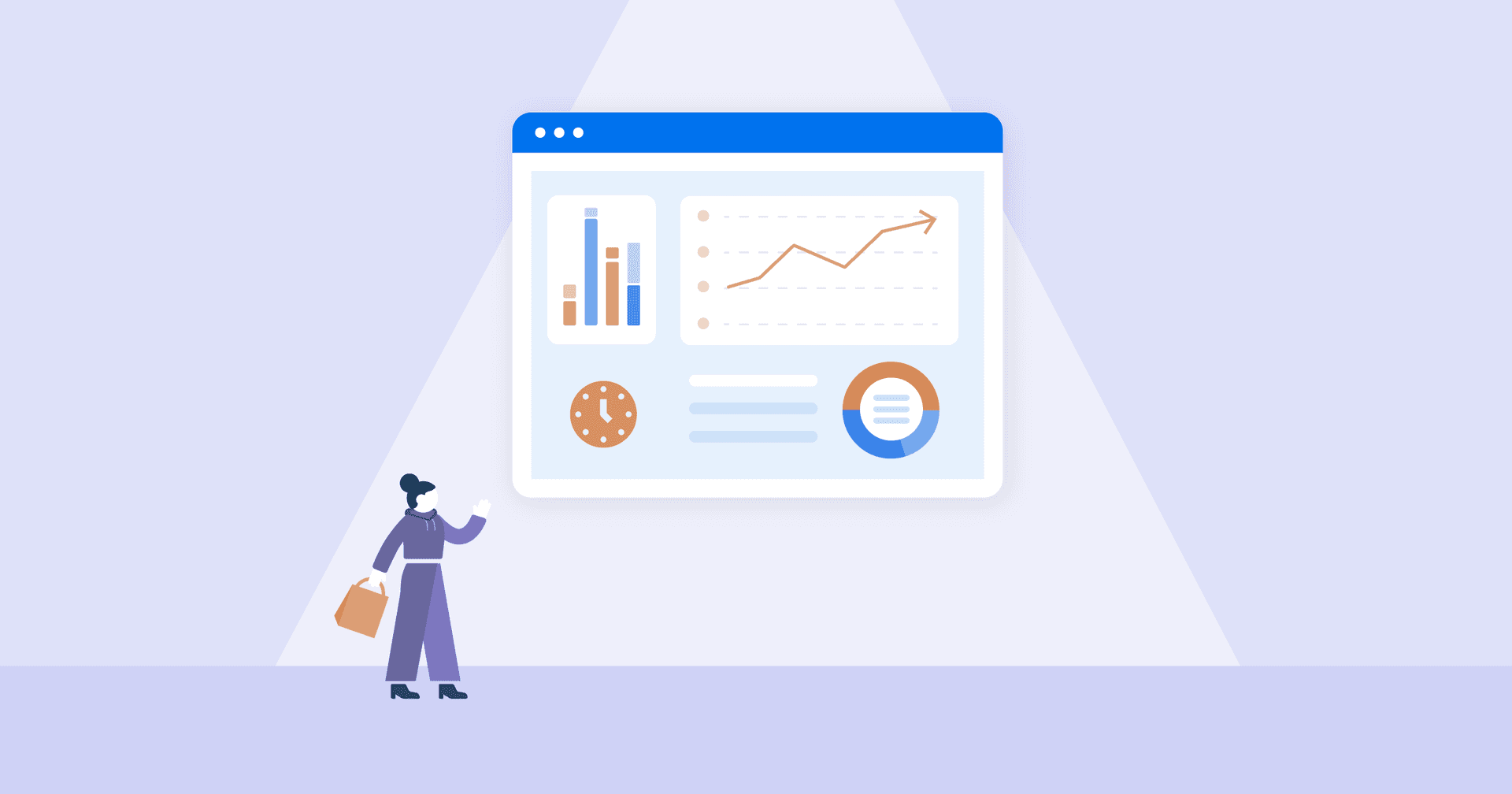Table of Contents
QUICK SUMMARY:
The adoption of AI in digital marketing has transformed the industry, helping teams analyze data, automate workflows, and create content faster and smarter. For agencies, it’s a chance to elevate strategies, impress clients, and stay ahead in a competitive market. In this article, we share tips for better utilizing AI within daily agency operations.
From evolving algorithms in search engines to new social media platforms and shifts in email marketing best practices, there's always been a lot to keep up with in the digital marketing space. Now, there's a new major player that marketing teams everywhere have rapidly adopted: artificial intelligence.
AI in digital marketing has swiftly become a widespread phenomenon. Machine learning and natural language processing are supporting more data-driven capabilities. Meanwhile, AI-powered content generation, data entry, and the ability to automate marketing tasks is alleviating manual workloads and freeing up time for deeper work.
Suffice it to say, digital marketers are operating in a whole new playing field—and the pace of change isn't showing any signs of slowing down. According to Forbes, AI market size is expected to reach $407 billion by 2027. So many digital advertising and marketing agencies are wondering how to get caught up with this new technology, setting themselves ahead of their competition and providing more value for their clients.
Want to get the full scoop on AI in digital marketing, how your agency might make the most of AI tools, and where to start? Keep reading for everything you need to know about digital marketing AI today and into the future.
What Is AI in Digital Marketing?
Artificial intelligence (AI) is a tool that most digital marketers use today to support various aspects of their work. According to the AgencyAnalytics Marketing Agency Benchmarks Survey, the majority of agencies predict that AI usage will continue to increase in the coming years.
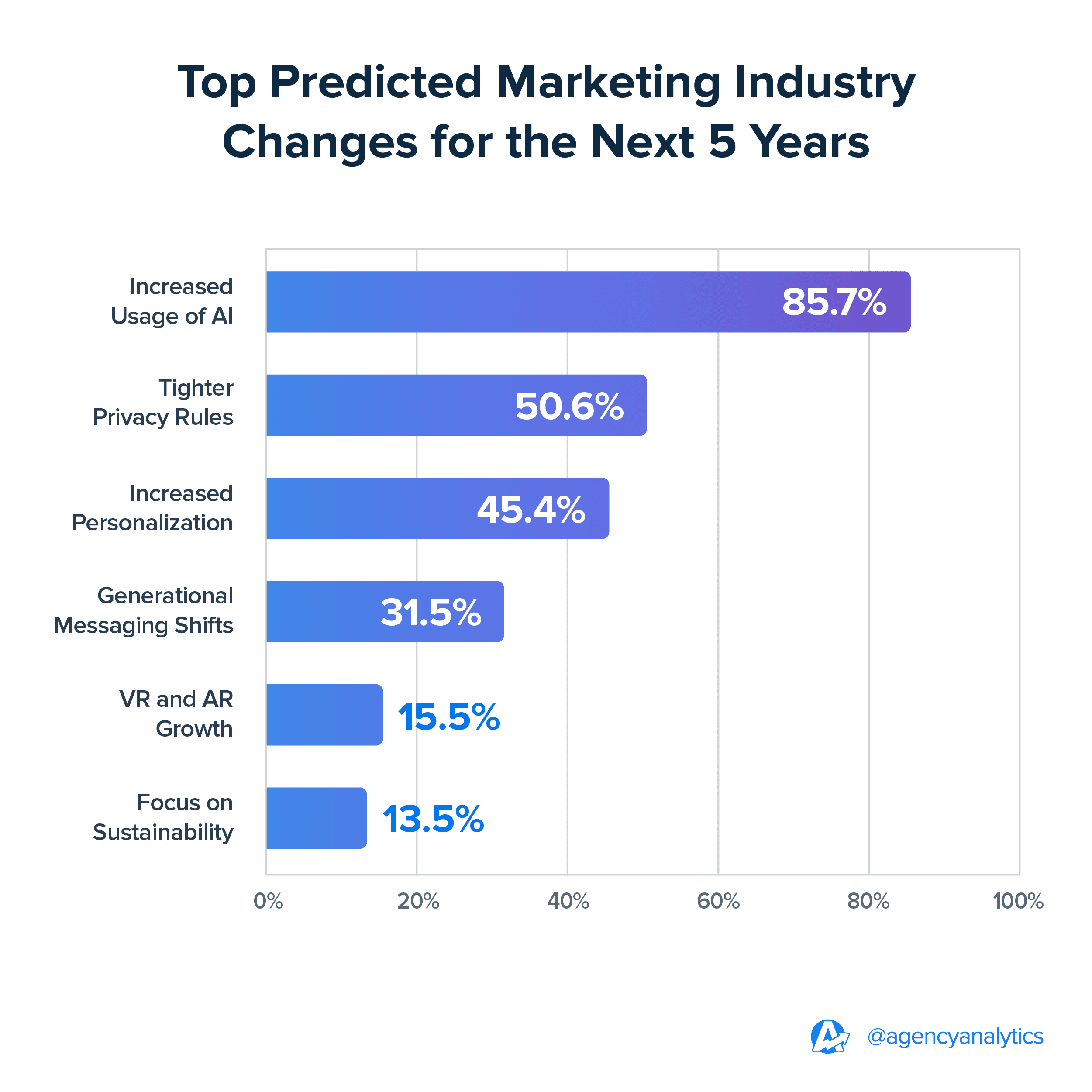
The technology is transforming how teams approach everything from crafting ad campaigns to optimizing ad spend to analyzing performance data. AI has quickly gone from a novelty to a necessity, and continues to evolve and impact marketing teams with every week that goes by.
One of the most significant contributors to High Five Media's growth has been our strategic adoption and implementation of Artificial Intelligence (AI) across various aspects of our agency's operations. Recognizing the potential of AI to revolutionize the marketing industry, we proactively embraced this technology to stay ahead of the curve and better serve our clients.
Jessica Crist, Production Manager, High Five Media
Why Should Digital Marketing Agencies Care About AI?
Agencies that want to stay ahead of the curve should absolutely be implementing artificial intelligence tools in their workflows (more on how to do that a bit further down). Not only will AI make your marketing strategies sharper and more relevant, but implementing AI also shows your clients that you're dedicated to maximizing efficiency and improving the results you achieve for them. It shouldn’t be your agency against the AI, but your agency working together with AI towards stronger results.
With 83% of companies claiming that AI is a top priority in their business plans, finding ways to use AI effectively is an important way to align your service offering with your clients' core business goals. If they're keen to find AI solutions to their challenges, it's a powerful relationship-building tactic to show them that you are, too.
Further, there’s the issue of clients believing that they can use AI to carry out certain projects themselves, rather than working with an agency; the perennial example being clients crafting their own blog posts using ChatGPT. With the risk of losing income on the horizon, agencies need to care about AI in order to anticipate any risks to business growth, and continue to provide services that are of value to clients.
So if we want to stay in business, given what is being automated by artificial intelligence, we need to ask: How quickly is it going to be automating the things that we are currently responsible for? And if it's automating big chunks of what we're responsible for, what are the things that we can still provide value in as marketing agencies sustain business so effectively? Ad optimization, ad creation… Most of that's going to be gone. Google's taking that away from us Facebook's taking that away from us.
Matthew Reginie, CEO, Prospect Future
Applications of AI in Digital Marketing
There are a number of ways that artificial intelligence is used in digital marketing, from data analysis to workflow improvements to creating quality content. Let's dive a little deeper into how AI is transforming key areas in the industry and helping digital marketing teams improve efficiency, accuracy, and scalability.
Data Analysis
AI-driven data analysis helps marketers make sense of huge amounts of data, pulling out actionable insights faster than traditional methods. This applies to audience, competitor, and customer data that helps companies better understand their markets and forecast consumer behavior, as well as performance data to track and optimize their marketing campaigns.
Parsing through numbers and drawing conclusions from them is often time-consuming and requires a lot of educated guessing. Artificial intelligence tools take the guesswork out and help by providing data-driven insights that your team may not have thought of. This is a great way to enhance your client reporting with AI.
How To Do It
AgencyAnalytics pulls data from your entire tech stack to make data analytics and client reporting easy, effective, and fast. The Ask AI feature is one of the new AI reporting tools, and it analyzes client data to identify trends, opportunities, and potential issues, providing your team with instant, actionable insights. This helps your agency make smart, data-informed recommendations for clients in your reports—without wasting billable hours.
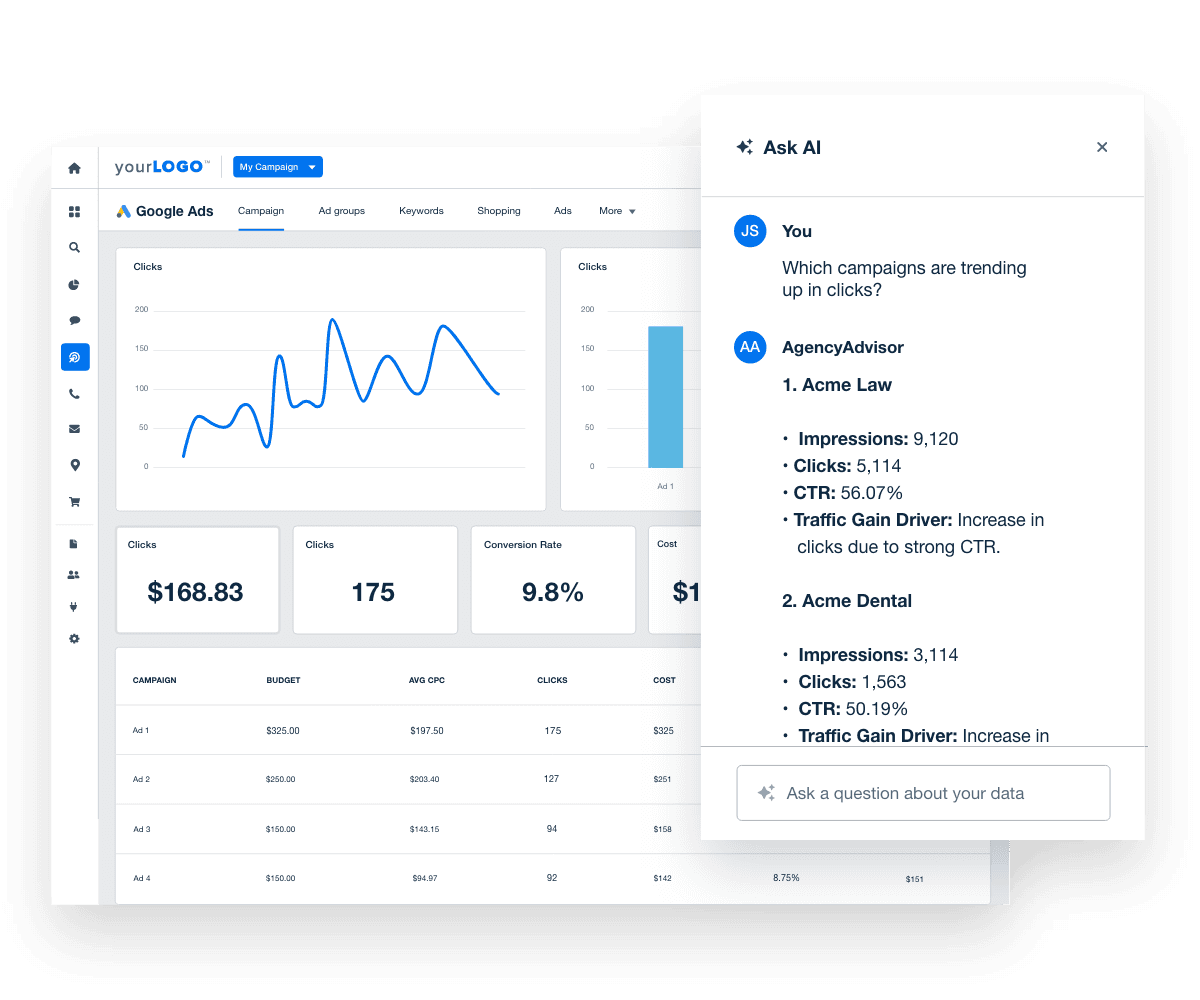
With Ask AI, instantly surface meaningful insights in just a few clicks. Identify trends, standout results, and opportunities–try AgencyAnalytics free for 14 days!
Streamlining Workflows
Another impactful application of AI in digital marketing is to use artificial intelligence to streamline and optimize your team's workflows. AI technologies are capable of automating repetitive, time-consuming marketing tasks, freeing up your team's time to focus on more impactful work.
Which routine tasks you choose to automate with AI will depend on where it will have the most impact for your team. You might decide to completely automate basic reporting, ad budget management, or on-page search engine optimization. Or, you might integrate AI marketing tools into your team's regular workflows to speed up processes without sacrificing human oversight.
AI-based automation has revolutionized our workflow processes, leading to increased efficiency and reduced operational costs. Tasks such as lead nurturing, email marketing, and campaign reporting have been automated, allowing our team to focus on strategic initiatives and client interactions.
Jessica Crist, Production Manager, High Five Media
How To Do It
Another new AI reporting tool in AgencyAnalytics is the AI Summaries feature. It automatically generates concise, high-level overviews of client reports and dashboard sections, helping your team bring meaningful insights and recommendations to clients faster. Summaries are customizable to align with client goals, helping to keep the information relevant and applicable.
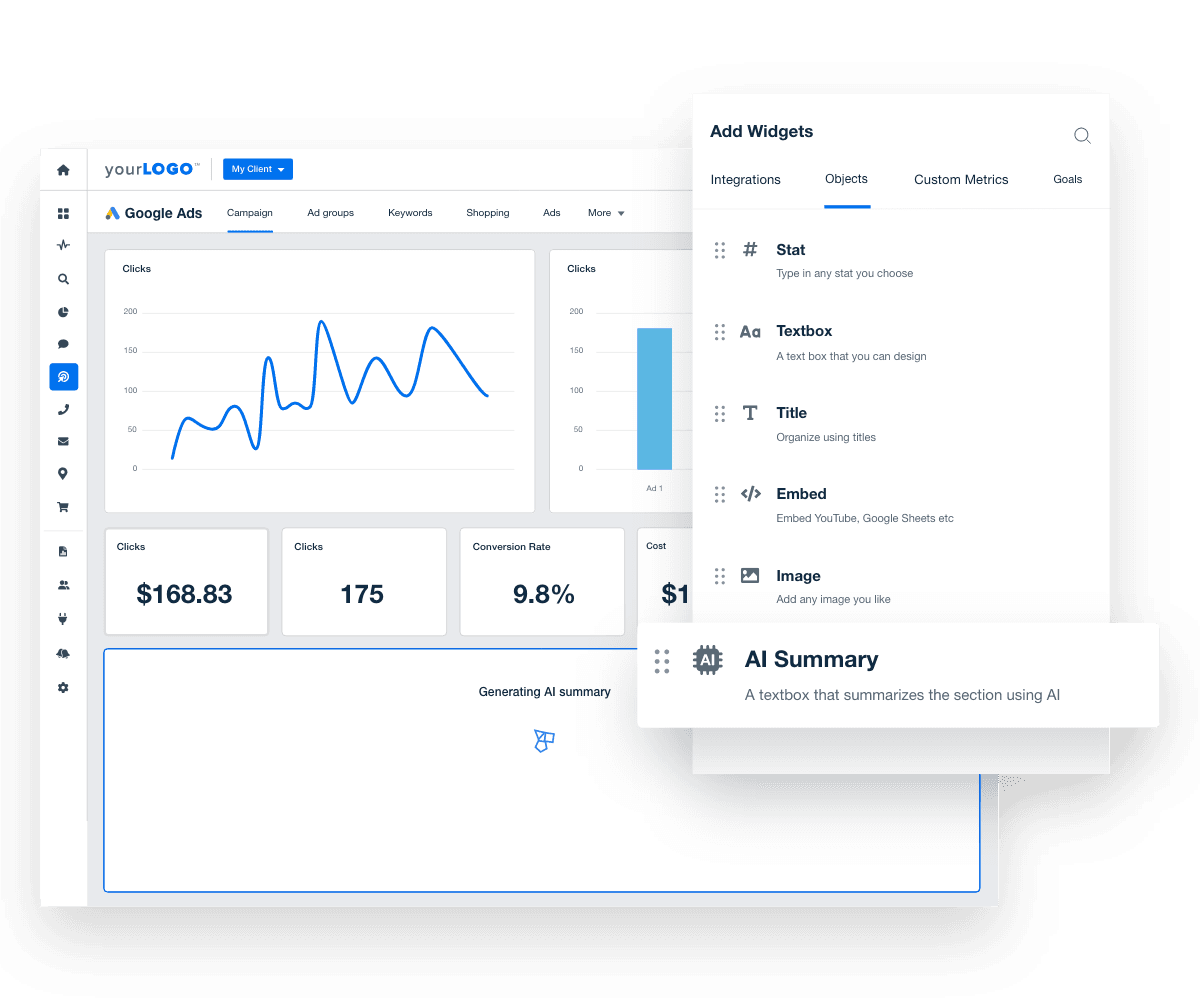
Save time and clearly prove your agency’s ROI with an AI Summary! Simply drag and drop the widget onto your client dashboard or report, and edit to customize. Sign up now for your free AgencyAnalytics 14-day trial.
Content Creation
The most well-known use for AI in digital marketing might be content creation. From blog post writing to email marketing to creating social media posts and web pages, AI generated content is everywhere these days. Content marketing is a big part of many brands' digital marketing efforts, and content production is time-consuming, so it's understandable that many teams are using artificial intelligence to craft their content.
Your agency might use AI to generate content for the marketing campaigns you run for your clients—but you also might use it to craft client-facing content and improve customer service. This could include proposals, briefs, and contracts, or it could extend to when you develop customer profiles or a marketing strategy for a new client.
AI-powered tools have enabled us to streamline content creation and optimization processes. From generating compelling copy to optimizing website content for SEO, AI algorithms have expedited tasks that once required extensive manual efforts. The result has been an increase in productivity and the ability to deliver content at scale without compromising quality.
Jessica Crist, Production Manager, High Five Media
How To Do It
Your team might use ChatGPT or any other popular LLM to create relevant content. You also might seek out specific AI marketing tools your agency can use for drafting copy or content, creating graphics, and other more specialized applications in your content creation process. For client-facing content, you might look into AI software that supports customer experience management.
How To Improve the Use of AI at Your Digital Marketing Agency
By now, you’ve likely already implemented some use of artificial intelligence within your agency's operations. But if you’re looking to ensure that your AI tools and strategies are positioned to improve your workflows, enhance your marketing strategies, and provide significant value for your clients, it’s best to take the following steps:
1. Define Goals
Before you launch into any new process or start testing out new marketing tools, it's always good to figure out what exactly you're trying to achieve. Are you looking to boost client satisfaction, streamline internal processes, or enhance your agency’s reporting capabilities?
Align with key stakeholders across your agency on what the main business goals are, and start from there. Be specific about the outcomes you want, as this will guide the types of AI tools and strategies that will serve you best.
Agency Example: Suppose one of your current business goals is to reduce the time spent creating and delivering client reports at your digital marketing agency. This could become a key focus area for how you'll leverage AI analytics tools for your agency's reporting process.
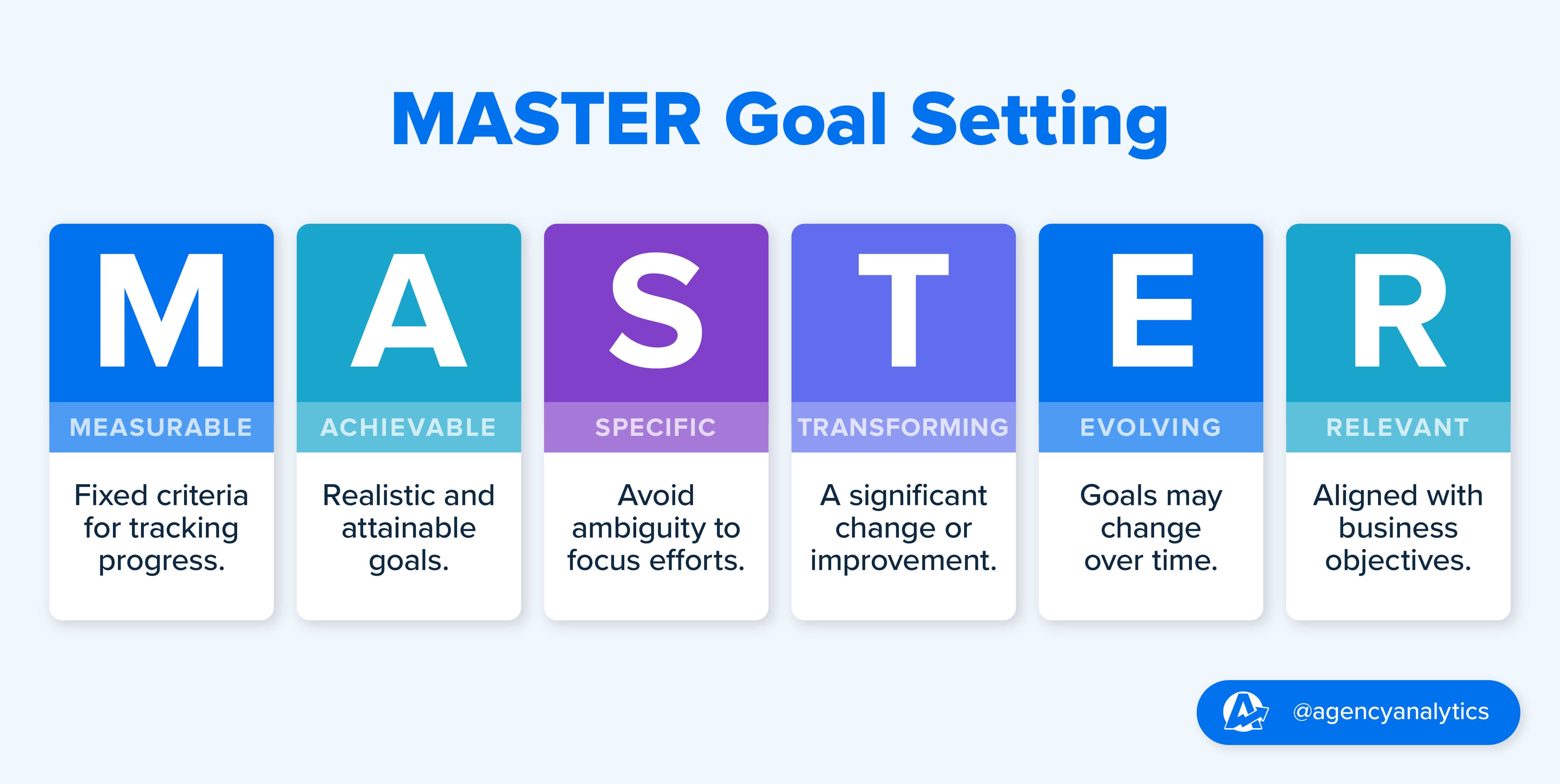
2. Identify Opportunities
Once you have your goals decided, you'll be able to start looking for opportunities where artificial intelligence would have the greatest impact within that area of your business. Dig into where your agency excels and where you've faced challenges. What could be amplified, and what could be improved?
It's been said that AI is a 'solution in search of a problem', and the last thing you want to do is implement AI systems for the sake of it. Instead, think of it like approaching any other business problem and seek out the opportunities before you start jumping ahead to the shiniest, newest AI marketing tools.
Agency Example: Continuing from the example above, to improve your reporting process your agency might start by using AI to analyze your client data. What does the historical data tell you about what your target audience cares about? What data is the most important to illustrate the role your strategies played in successful campaigns? How does this data align with market trends?
3. Understand Team Capabilities
This is along the same lines as identifying opportunities, but it's a bit more specific. Look at the team you have and assess their greatest strengths as well as any skills gaps. Where could artificial intelligence act as a team member, or give your team members a much-needed boost?
This is an especially important consideration in the current climate of businesses needing to do more, with less. No machine will ever be able to replace your all-star employees, but if it's able to alleviate the workload for the ones you have so they're not overloaded, that's a win. You need your team members engaged and high-performing to do their best work and deliver the greatest value to your clients!
Agency Example: Align your first AI-driven digital marketing efforts where they'll deliver the most value to your team. If you don't have a dedicated social media marketing specialist, you might prioritize building an AI-powered social media calendar system. If your content team is overstretched, it's worth checking out some content generation tools.

Keep track of who’s doing what by assigning tasks in AgencyAnalytics. Set goals and track progress–try it free for 14 days.
4. Select the Right Tools
Armed with your internal research about the goals, opportunities, and skills gaps you want to take on with artificial intelligence, you're ready to start shopping for AI tools. There have always been tons of marketing tools available, but with the rise of AI in digital marketing, it feels like even more tools and tech to sift through.
It's important to be selective about which AI marketing tool or tools you implement, so you don't end up making your agency's tech stack more complex. Look for digital marketing tools with AI features that help make your agency's processes simpler and more streamlined and that integrate with your existing toolkit. This will help reduce frustrations from both your team and your clients. Start with a curated agency software stack that integrates cleanly.
Agency Example: A platform like AgencyAnalytics helps connect your existing systems, rather than becoming another separate software to navigate. It's a client reporting tool that pulls data from more than 80 sources together for simplified client reporting, making it easier for your team to provide regular updates on your clients' social media campaigns, digital advertising efforts, and email marketing—all in the same dashboard.
5. Test and Analyze
Finally, one of the most important steps of implementing AI tools at your digital marketing agency is tracking how they're working and evaluating their impact. In the digital marketing landscape, things change fast—and AI marketing is evolving at warp speed. Any time your agency is trying out new tools, it's important to check in periodically and understand the ROI you're getting from them.
When you start using a new AI marketing tool, set some goals and decide on KPIs you'll track to evaluate their efficacy. Try out more than one tool if you're not sure what the best one will be, and track how each one performs for your needs. Stay flexible and agile while testing different AI technologies to ensure you’re maximizing their impact.
Agency Example: If your team is producing AI generated content, track your time logs to see whether editors' time investment has gone down per piece. If you're managing Google Ads spending using AI, keep track of whether the tech is helping to cut costs. For teams using machine learning to predict performance, you'll want to assess the accuracy of those predictions over time.
Impress clients and save hours with custom, automated reporting.
Join 7,000+ agencies that create reports in minutes instead of hours using AgencyAnalytics. Get started for free. No credit card required.
AI Powered Marketing Is the Future, and the Present
AI in digital marketing isn't a passing trend—it’s here to stay, and agencies need to be learning the ropes of this new tech if they want to offer the most competitive and forward-focused services for their clients. By leveraging AI marketing, your team will produce stronger marketing campaigns for your clients and deliver a superior client experience—all while saving time and achieving cost savings.
Embracing AI has been a transformative journey for High Five Media, empowering us to offer cutting-edge solutions to our clients. However, it's essential to note that our success with AI implementation is not solely attributed to technology. The driving force behind our growth has been our team's adaptability, innovation, and dedication to mastering AI tools and applying them creatively to meet our clients' needs.
Jessica Crist, Production Manager, High Five Media
While digital marketing AI is certainly a game changer, remember that rushing to try out all the flashiest new software is rarely the best approach. Be strategic about how you integrate AI into your agency's workflows, and make sure that these systems are helping your teams work smarter, not harder.

Written by
Kyra Evans is the Manager of Content Marketing at AgencyAnalytics. She has over 15 years of experience writing content for SaaS, tech, and finance brands. Her work has been featured by HuffPost and CBC, and she serves an engaged social media readership of over 30,000 community members.
Read more posts by Kyra EvansSee how 7,000+ marketing agencies help clients win
Free 14-day trial. No credit card required.



